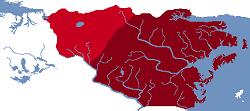Haida: Difference between revisions
mNo edit summary |
No edit summary |
||
| Line 1: | Line 1: | ||
{{Template:WIP}} | {{Template:WIP}} | ||
{{Infobox country | {{Infobox country | ||
|conventional_long_name = Imperial Commonwealth of the | |conventional_long_name = Imperial Commonwealth of the People | ||
|native_name = ''Guuj Xaat Kil Tlagaang'' | |native_name = ''Guuj Xaat Kil Tlagaang'' | ||
|common_name = Haidaland | |common_name = Haidaland | ||
| Line 12: | Line 12: | ||
|image_map = Haidaterritory.png | |image_map = Haidaterritory.png | ||
|loctext = Northwestern Gwaii | |loctext = Northwestern Gwaii | ||
|map_caption = The | |map_caption = The ICOTP indicated in dark red, satellite state indicated red | ||
|capital = Tlat'uu | |capital = Tlat'uu | ||
|largest_city = ^ | |largest_city = ^ | ||
|official_languages = Haida, Chinook | |official_languages = Haida, Chinook | ||
|national_languages = Salish, Tsimshian, Wakashan | |national_languages = Salish, Tsimshian, Wakashan, Gwaii Grenfeldr | ||
}} | }} | ||
The '''Imperial Commonwealth of the | The '''Imperial Commonwealth of the People''' (Guuj Xaat Kil Tlagaang), shortened to ICOTP and more commonly known as '''Haidaland''' or 'the Haida', is a Semi-Consitutional monarchy located in Northeastern [[Gwaii]]. Bordered by [[Volgorodov]] and [[the Salish]] in the west, the [[Gwaii Ice Sheet]] in the north, [[Haida Bay]] and [[Grenham]] in the east. It has an estimated population of 375 million, which is spread across nearly 1/4 of the continent of Gwaii. The Capital and largest city is Tlat'uu. | ||
== Etymology == | == Etymology == | ||
Guuj Xaat Kil Tlagaang translates to "Imperial People Land" but can also mean "Great People Land" or "Big Haida Land". "Guuj" used to mean "big" but the word "Imperial" and "Great" have been attached to it as well. "Xaat Kil" meant the Haida alone in the past but has changed into meaning "people", with "Xaayda" replacing "Xaat Kil" has the demonym of the Haida people. "Tlagaang" has remained relatively unchanged, meaning "land" most of the time, but it has also been used as the word for "Nation" or "State". | |||
== History == | == History == | ||
[[Category: Guuj Xaat Kil]] | [[Category: Guuj Xaat Kil]] | ||
{{Template:FOA info pages}} | {{Template:FOA info pages}} | ||
[[Category:FOA]] | [[Category:FOA]] | ||
Revision as of 18:02, 22 February 2021
This article is incomplete because it is pending further input from participants, or it is a work-in-progress by one author. Please comment on this article's talk page to share your input, comments and questions. Note: To contribute to this article, you may need to seek help from the author(s) of this page. |
Imperial Commonwealth of the People Guuj Xaat Kil Tlagaang | |
|---|---|
|
Flag | |
| Motto: "Xaadas Tlagáay t'álg hlan-gwáay!" "The Haida Above All!" | |
| Anthem: "Xaadas Sgaláangaa" "Song of the Haida" | |
 The ICOTP indicated in dark red, satellite state indicated red | |
| Location | Northwestern Gwaii |
| Capital | Tlat'uu |
| Largest city | ^ |
| Official languages | Haida, Chinook |
| Recognised national languages | Salish, Tsimshian, Wakashan, Gwaii Grenfeldr |
The Imperial Commonwealth of the People (Guuj Xaat Kil Tlagaang), shortened to ICOTP and more commonly known as Haidaland or 'the Haida', is a Semi-Consitutional monarchy located in Northeastern Gwaii. Bordered by Volgorodov and the Salish in the west, the Gwaii Ice Sheet in the north, Haida Bay and Grenham in the east. It has an estimated population of 375 million, which is spread across nearly 1/4 of the continent of Gwaii. The Capital and largest city is Tlat'uu.
Etymology
Guuj Xaat Kil Tlagaang translates to "Imperial People Land" but can also mean "Great People Land" or "Big Haida Land". "Guuj" used to mean "big" but the word "Imperial" and "Great" have been attached to it as well. "Xaat Kil" meant the Haida alone in the past but has changed into meaning "people", with "Xaayda" replacing "Xaat Kil" has the demonym of the Haida people. "Tlagaang" has remained relatively unchanged, meaning "land" most of the time, but it has also been used as the word for "Nation" or "State".
